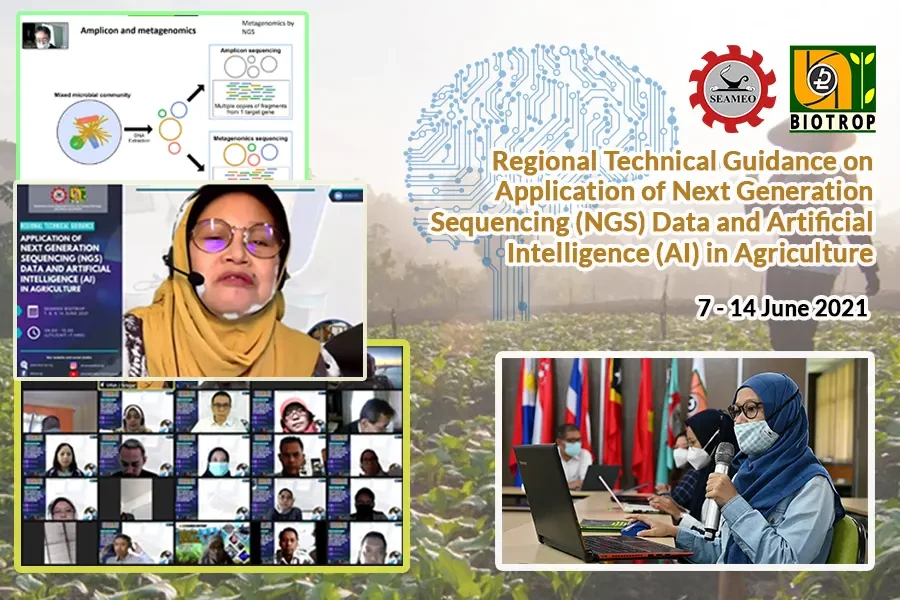SEAMEO BIOTROP, the Ministry of Education, Culture, Sports, Science and Technology (MEXT), Japan and Institut Pertanian Bogor (IPB) collaborated in organizing a joint online regional technical guidance on Application of Next Generation Sequencing (NGS) Data and Artificial Intelligence (AI) in Agriculture. The technical guidance held on 7, 8, 9, and 14 June 2021 was aimed to share knowledge on recently developed genomic and transcriptomic approaches for conservation and sustainable utilization of tropical biodiversity, application of NGS data and AI in agriculture. The technical guidance was designed for university lecturers, researchers, graduate students, and staff of companies in the molecular biology field.
The resource person of this technical guidance was Dr Kazuo Ishii, a professor of genome science and an expert in artificial intelligence from the Department of Applied Information Engineering of the Suwa University of Science. Several lecturers from Institut Pertanian Bogor (IPB) were the co-resource persons and moderators in this event, i.e., Dr Ulfah J. Siregar, Dr Fitri Indriani, Fifi Gus Dwiyanti, PhD, Dr Deden D Matra, and Dr Rahadian Pratama.
The topics presented were Overview on NGS Data Analysis, Practical Work on NGS Data Analysis, Programming on Linux, Overview on GWAS and Re-sequencing, Designing a GWAS Experimental Research, Overview on RNA-Seq and Transcriptomic, Practical Work on Transcriptomic Data Analysis, Overview on AI and Machine Learning in Agriculture, and Developing a Proposal on AI and Machine Learning in Agriculture.
This technical guidance was actively participated by 174 participants from 9 countries, i.e. Brazil (1 person), Fiji (2 people), India (4 people), Indonesia (141 people), Malaysia (1 person), the Philippines (22 people), Sri Lanka (1 person), Timor Leste (1 person) , and Zimbabwe (1 person). Pre- and post- tests were carried out by the participants to access the participants' knowledge about NGS and AI in Agriculture before and after participating in the technical guidance.
Next-Generation Sequencing (NGS), as one of the highlighted aspects of molecular biology, is a technology for determining the sequence of DNA or RNA to study genetic variation associated with diseases or other biological phenomena. Next-generation sequencing (NGS) refers to large-scale DNA sequencing technology that allows for querying the entire genome (whole genome), the exons within all known genes (whole exome), or only exons of selected genes (target panel).
In supporting precision agriculture, artificial intelligence (AI) is developed to help farmers by providing them with proper guidance about nutrition and water management, optimum planting, timely harvesting, types of crops to be grown based on the environmental condition, crop rotation, pest, and diseases control and management.
(ujs/dr)
 Monday, 07 June 2021 on 1:50pm
Monday, 07 June 2021 on 1:50pm
